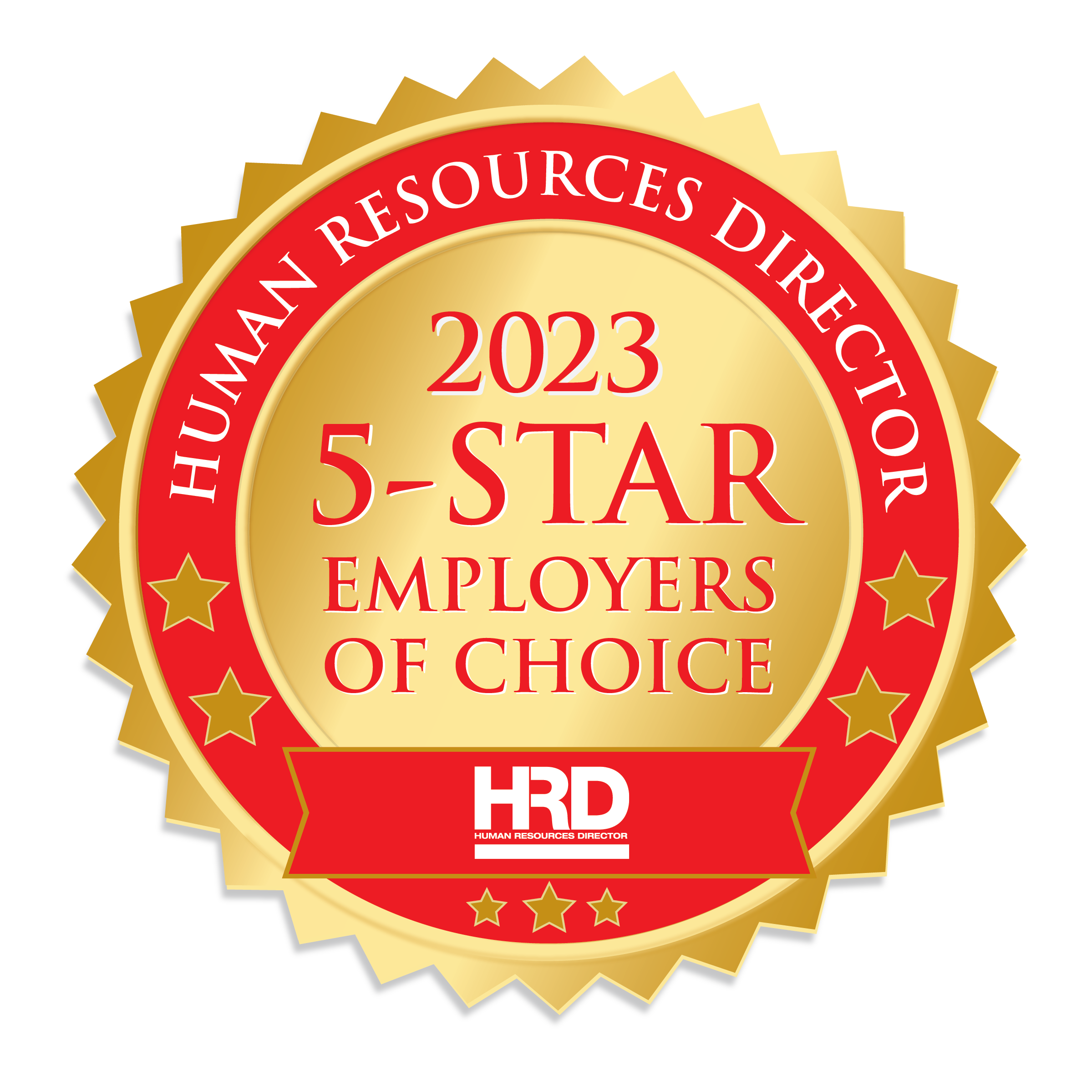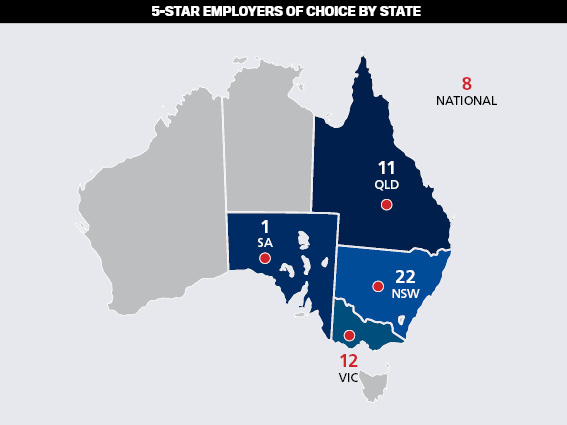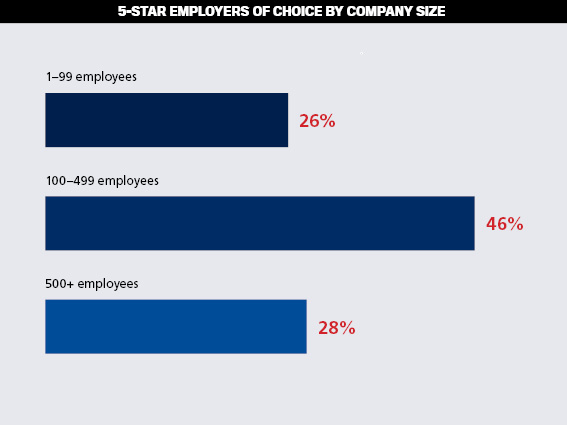

Jump to winners | Jump to methodology
The 2023 HRD 5-Star Employers of Choice awards celebrate some of the best organisations to work for in Australia.
According to Dr. Jane Gunn, who leads KPMG Australia’s People and Change practice, it is useful to think about how all of the top-performing companies’ HR policies are designed to maximise employee motivation. For example, thinking about an HR policy framework through the lens of self-determination theory helps top-performing companies to ensure that their HR policies support employees to have:
The Employers of Choice awards recognise 54 companies that have distinguished themselves by creating ingenious HR policies in areas that include:
Amanda Flouch, Deloitte Australia human capital lead partner, says, “Our point of view is that to be a leading employer, organisations must develop solutions that address the workforce distress indicators through a set of modern work standards.”
“We’ve got this mateship in our culture and in our organisation, and that’s what makes Australia and HR in Australia quite different to anywhere else in the world”
Waheeda Bhayani, Transdev Australasia

Transdev Australasia is a multimodal transportation organisation for state and public transportation authorities. It operates buses, ferries, and light rail across Australia and New Zealand, employing nearly 6,000 workers with 90% on the frontlines.
“You can’t take your tram home, you can’t take your bus home,” says Waheeda Bhayani, the head of people and culture. “HR had to really adapt during the pandemic considering we didn’t really have a white collar or corporate workforce.”
In addition to COVID, another challenge that Transdev Australasia had to deal with over the past 18 months was a shortage of around 1,000 drivers.
To adapt, the organisation added:
Transdev Australasia is also now funding training, onboarding, and license upgrades.
A S Harrison & Co., a supplier of quality chemical additives, has also experienced recruitment and remuneration issues.
“We’re still seeing the backlog of migrants into Australia, the lack of candidates applying for jobs,” explains Robert Feltrin, group HR leader at A S Harrison & Co. “We’ve had some roles going for 12 months and no candidates or remuneration expectations were so high. You want to pay for top talent but at the same time you can’t afford that as a business all the time – it’s a huge risk.”
To adapt, they have relied on:
The firm also promotes dialogue across their internal hierarchical structures.
“Our staff have access to go and talk to our CEO and ask any business-related questions in an informal space,” says Feltrin.
They have also refined the concept into an initiative called Day in the Life.
Feltrin comments, “Staff can spend five days a year working with the CEO directly or working with the HR team to get them exposure to what leadership can look like on the different levels of the organisation.”
“We don’t train staff just for now or three years or five years, we actually train them for their career”
Robert Feltrin, A S Harrison & Co
Bendelta is a boutique management consultancy focused on realising human potential through work in leadership, culture, organisational design, and strategy. The company lacked a hierarchy but needed additional structure to deal with fast growth.
Anthony Mitchell, the chief potential officer, says, “We really wanted to give people a sense of home, a smaller group that they felt really connected to. So, we created Pods, which had a random distribution of people not related to the work they did.”
During the pandemic, Mitchell realised the idea needed to be modified. So, Bendelta created eight Pods and let employees choose their two favourite groups, but emphasised they didn’t have to work solely in that area.
“You can still work with whomever you like and do any kind of projects you want,” explains Mitchell. “I think we found a nice compromise as a way of boosting efficiency and focus on practical expertise while still enabling collaboration and freedom.”
A vital area for measuring how well an employer is performing is their corporate culture, via the lens of DEI.
Deloitte Australia’s Flouch explains, “Delivering meaningful and equitable outcomes requires a well-crafted DEI strategy and implementation plan that has leadership buy-in and support, as well as the necessary financial resources and dedicated full-time workers across the organisation to ensure the best possible outcomes.”
Data shows 86% of business leaders say embedding DEI into everyday ways of working while measuring outcomes is important to their organisations’ success, but only 25% feel ready to address the issue.
Bendelta has taken steps in this direction.
Mitchell says, “Just in terms of gender: the board is two-thirds female, the shareholders are over 50% female, and the composition of the senior management team is over 50% female. And I think we’ve got about 100 people from about 45 different countries of origin.”
Also following this path is Transdev despite the particulars of its sector.
“Transportation is generally a very male-dominated industry,” explains Bhayani. “We have tried very hard to push the gender balance. We’ve got a lot more females in our management and in our senior leadership now than we have had before.”
A S Harrison & Co is also aiming to be more equitable.
“We’re really closing that sort of gender pay gap, creating more opportunities for women in the organisation,” adds Feltrin.
“We bring the entire company together every month face to face from every office around the country for a day of learning – a massive investment – but we’re signifying how much we believe in them”
Anthony Mitchell, Bendelta

To help determine some of the best companies to work for in Australia, we judged nominees in 10 categories. Here, the 5-Star winners reflect on a selection of those.
RemunerationTraining and professional development
Access to technology and resources
Work-life balance
Recruitment
KPMG Workplace Relations Advisory partner Nina Spiccia highlights regulatory shifts.
“The Federal Labor Government has already passed the largest industrial relations changes in more than a decade – via the Fair Work Legislation Amendment (Secure Jobs, Better Pay) Act – and is scheduled to pass more changes later this year, which is likely to have significant impacts on HR and employee relations,” she says. “This rapidly changing landscape means employers need to be more alert about significant changes that may impact their HR policies, workforce model, and employee relations approach.”
Bhayani underlines becoming one of the best companies to work for in Australia is a challenging proposition. “Australia is very multicultural. Lots of countries have good collaboration and good communication, but we’ve got mateship. People ask me, ‘Why do you stay here at Transdev? And it is the people,” she says.
“We’ve got this mateship in our culture and in our organisation, and that’s what makes Australia and HR in Australia quite different to anywhere else in the world.”
In December 2022, the call went out for nominations for HRD’s 5‑Star Employers of Choice awards. Organisations of all sizes and across all industries in Australia were encouraged to participate. Entries were scored on the companies’ achievements and initiatives across a range of areas, including leadership, learning and development, wellbeing, flexibility, diversity and inclusion, work-life balance, and recruitment.
The editorial review board considered both qualitative and quantitative data, such as engagement survey results, average employee tenure, and turnover rate. In 2023, 54 organisations have been commended for their achievements and selected as HRD’s 5‑Star Employers of Choice.